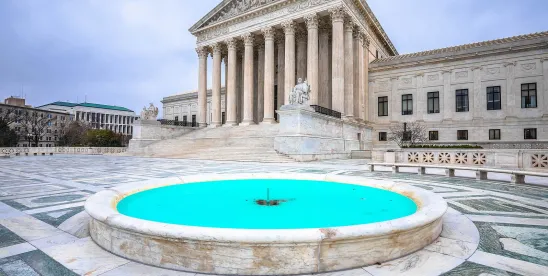Recent legal developments may doom the Federal Trade Commission (FTC) Noncompete Rule (the “Rule” or the “Noncompete Rule”). The recent Supreme Court decision in Loper Bright Enterprises v. Raimondo has significant implications for the enforcement of administrative rules, including the FTC’s Rule. Likewise, on July 3, 2024, a federal court in Texas issued an injunction against the FTC’s Noncompete Rule, which highlights the significant judicial resistance to the regulation and reflects broader challenges the FTC faces in implementing the proposed Rule.
The FTC’s Noncompete Rule
- Proposed Rule: The FTC’s proposed rule aimed to ban most noncompete clauses, arguing that such agreements restrict worker mobility and suppress wages. The Noncompete Rule is scheduled to take effect on September 4, 2024.
- Legal Challenges: The Rule has faced legal challenges from businesses and industry groups, arguing that the FTC overstepped its authority. Two recent decisions — Chevron U.S.A., Inc. v. Natural Resources Defense Council and Ryan LLC v. Federal Trade Commission — have crippled the Noncompete Rule and jeopardized enactment in September 2024.
A series of recently decided court cases will impact whether the FTC’s proposed Rule survives.
The Law Since 1984 — The Chevron Deference Doctrine
- Agency Deference: In 1984, the U.S. Supreme Court ruled in Chevron U.S.A., Inc. v. Natural Resources Defense Council, Inc. that courts should defer to agency interpretations of ambiguous statutes that the agency administers, as long as the interpretation is reasonable.
- Impact: This doctrine has given agencies like the FTC substantial authority to interpret and enforce regulations, even when the statutory language is ambiguous. The FTC relied on this doctrine in enacting the Noncompete Rule.
The Supreme Court Changes the Law
- Supreme Court Decision: on June 28, 2024, the Supreme Court issued its decision in Loper, effectively overruling the Chevron deference.
- Implications: Without the Chevron deference, agencies now face a higher burden of proof in demonstrating that their regulatory actions are justified under the statutes they administer. Courts will no longer automatically defer to the agency’s interpretation, instead engaging in a more rigorous review of the statutory language and the agency’s rationale.
The Ryan Foods Case Is the First to Enjoin the Enactment of the FTC Noncompete Rule
Ryan Foods, a major food distribution company, filed a lawsuit challenging the FTC’s authority to enforce a nationwide ban on noncompete agreements. As we previously reported, a federal district judge issued an injunction on July 3, 2024, barring enforcement only against the parties and members of the parties to the litigation. The court focused on two issues: (1) the likelihood that the FTC had overreached and exceeded its authority to develop substantive rules based on the recent Loper decision; and (2) a total ban on all noncompetes would likely be arbitrary and capricious. In addition, the court noted its hesitation to issue a nationwide injunction, thereby leaving other pending cases as possible avenues to stop the September implementation date.
What Are the Impacts of Loper and Ryan Foods on the FTC Noncompete Rule?
The impacts of the recent decisions cannot be overstated because of the proximity of the September 4, 2024, effective date of the proposed FTC ban. Below are some important ramifications of the recent rulings:
- Increased Judicial Scrutiny: The ruling against the FTC in the Ryan Foods case exemplifies the increased judicial scrutiny the agency will face post-Loper.
- Regulatory Uncertainty: With courts issuing injunctions against the ban, there is significant uncertainty about the future of the FTC’s Noncompete Rule. This could discourage the agency from pursuing aggressive enforcement of the Rule.
- Impact on Businesses: Businesses like Ryan Foods are likely to continue challenging the Rule, arguing it harms their competitive edge and ability to safeguard proprietary information.
- Legislative Actions: Given the judicial pushback, there may be calls for Congress to clarify the statutory authority of the FTC regarding noncompete agreements, potentially leading to new legislation.
- Legal Precedent: The injunction in the Ryan Foods case could set a legal precedent for other businesses to challenge the FTC’s Noncompete Rule, leading to a patchwork of legal battles across the country.
- Administrative Authority: The decision reflects a broader trend of judicial skepticism toward expansive interpretations of administrative authority, particularly in light of the Supreme Court’s recent rulings.
Conclusion
The Ryan Foods injunction against the FTC’s Noncompete Rule underscores the significant legal challenges the FTC faces in enforcing this Rule. The combination of the Supreme Court’s reversal of the Chevron deference as well as the specific legal arguments in cases like Ryan Foods make it increasingly difficult for the FTC to implement its Rule without clear and explicit statutory backing. The Ryan Foods case exemplifies the broader judicial resistance to regulatory overreach and highlights the ongoing legal and legislative battles that will shape the future of noncompete agreements in the United States.




 />i
/>i

